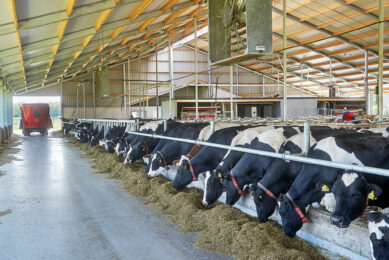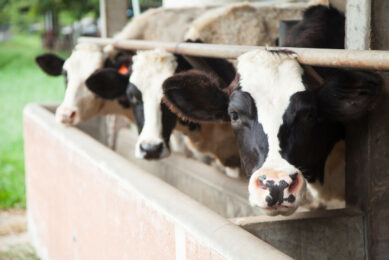Ivo Lansbergen, dsm-firmenich: “We need a data-driven approach to enhance sustainability”

Following a new season of the video series Future Feed Talks, All About Feed spoke with Ivo Lansbergen from dsm-firmenich about how data and precision farming solutions can support the industry to produce more efficiently and sustainably.
The new video series of Future Feed Talks covers the latest research, new trends, challenges and opportunities in the ruminant sector, with a special focus on precision nutrition. This upcoming season was recorded during the dsm-firmenich Global Ruminant Days in Vienna. Topic of discussion during the conference was precision nutrition for sustainable milk and beef. According to Ivo Lansbergen, president of animal nutrition & health at dsm-firmenich, precision farming solutions provide an opportunity for the ruminant sector to enhance sustainability.
On the horizon, there are growing pressures from various stakeholders to accurately measure and improve the sustainability of eggs, meat, milk and seafood. In this landscape, owning transparent data and robust sustainability credentials is becoming crucial for animal nutrition businesses.
Ubiquitous data and effective data management are emerging as the biggest enablers to tackle the challenges faced by the feed and animal protein industries. We need a data-driven approach to recognise and reward farmers with lower environmental footprints. By encouraging all farmers to adopt best practices, we can significantly reduce farming’s overall footprint. This will drive a “Race to the Top” in sustainability, aligning with food companies’ commitments to reducing carbon footprints through the Science Based Targets initiative (SBTi). By harnessing the power of data, businesses can substantiate their sustainability claims, optimise their operations, and contribute to a more sustainable and environmentally friendly animal agriculture sector.
We will also see significant changes in animal nutrition as advancements in our understanding of the animal microbiome and its impact on health, productivity and environmental footprint will lead to the development of targeted nutritional strategies. This may include the use of probiotics, prebiotics and other microbiome-modulating feed additives to improve animal performance and reduce emissions.
Furthermore, we will witness increased use of local ingredients, by-products and novel ingredients, such as algal oils and single-cell proteins, which can offer lower environmental footprints and less volatility in supply. Incorporating alternative ingredients into animal diets can improve the sustainability of feed and livestock production.
There is a unique opportunity for the ruminant sector to enhance efficiency and sustainability through precision livestock farming, data-driven decision-making and automation. This shift, driven by market demands for transparency and sustainability, can transform the dairy industry by turning an improved environmental footprint into a competitive advantage.
Ruminants provide a range of benefits to the environment and human society. They help maintain pasture areas and improve the productivity of marginal land. Furthermore, ruminants provide a great source of nutrients and protein for human diets, as well as income for many people.
Methane is a by-product of this process of converting non-human edible plant matter into milk and meat. Cow burps account for around 40% of global methane emissions. Adopting sustainable practices, such as methane-inhibiting feed additives and precision farming solutions can help reduce the environmental impacts by 30% or more.
The ruminant sector must proactively address concerns, through proactive engagement transparency, and effective communication strategies to highlight the sector’s progress towards sustainability.
A sustainable livestock sector is one that is good for people, farmers, producers and the planet.
At its core it must strike a balance between meeting the growing demand for animal-based products, ensuring the profitability and viability of the industry and minimising the environmental impact of livestock production.
At dsm-firmenich, through scientific innovation and collaborative partnerships with our customers, we’re pioneering ingredients and precision technologies that respect animals, people and the planet. For example, our Sustell platform measures environmental footprints at the farm level and has enabled data-driven decisions that improve productivity, farm profits and sustainability.
Bovaer, our breakthrough methane-reducing feed supplement, reduces cows’ enteric methane emissions to improve the sustainability of meat and dairy products. On average, it reduces emissions by 30% from dairy cows and 45% from beef cattle.
Through innovations like these, we have been able to create an ecosystem that allows profitability and sustainability to coexist.
The separation is about setting both our Animal Nutrition & Health business unit and the dsm-firmenich group up for further future success. dsm-firmenich believes that the full potential of the Animal Nutrition & Health business can be best realised through a different ownership structure.
My goal for Animal Nutrition & Health is to strengthen our distinctive position as a global leader with its unique and integrated combination of vitamins, premixes, performance solutions and precision nutrition.
By providing data-driven solutions, precision technologies empower livestock producers to reduce operational costs, enhance sustainability practices and identify strategic investment opportunities.
Through advanced platforms, the livestock industry is better equipped to meet the growing demand for animal-based products in an efficient and effective manner to feed the growing global population.
By promoting resource efficiency, minimising waste and emissions and supporting animal welfare, our precision technologies are elevating the productivity and sustainability of animal protein to the next level, ensuring that the growing global population can be fed in a responsible and environmentally friendly manner.











